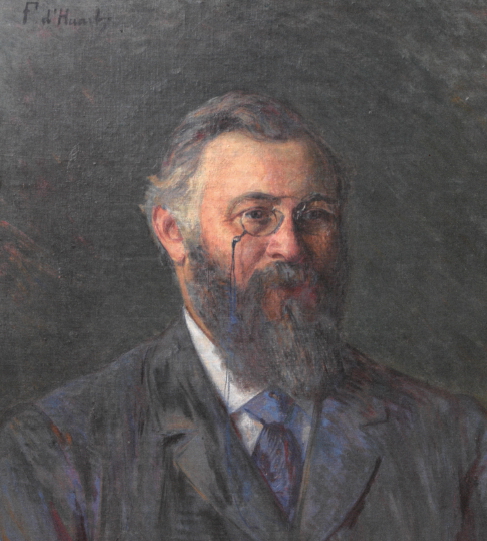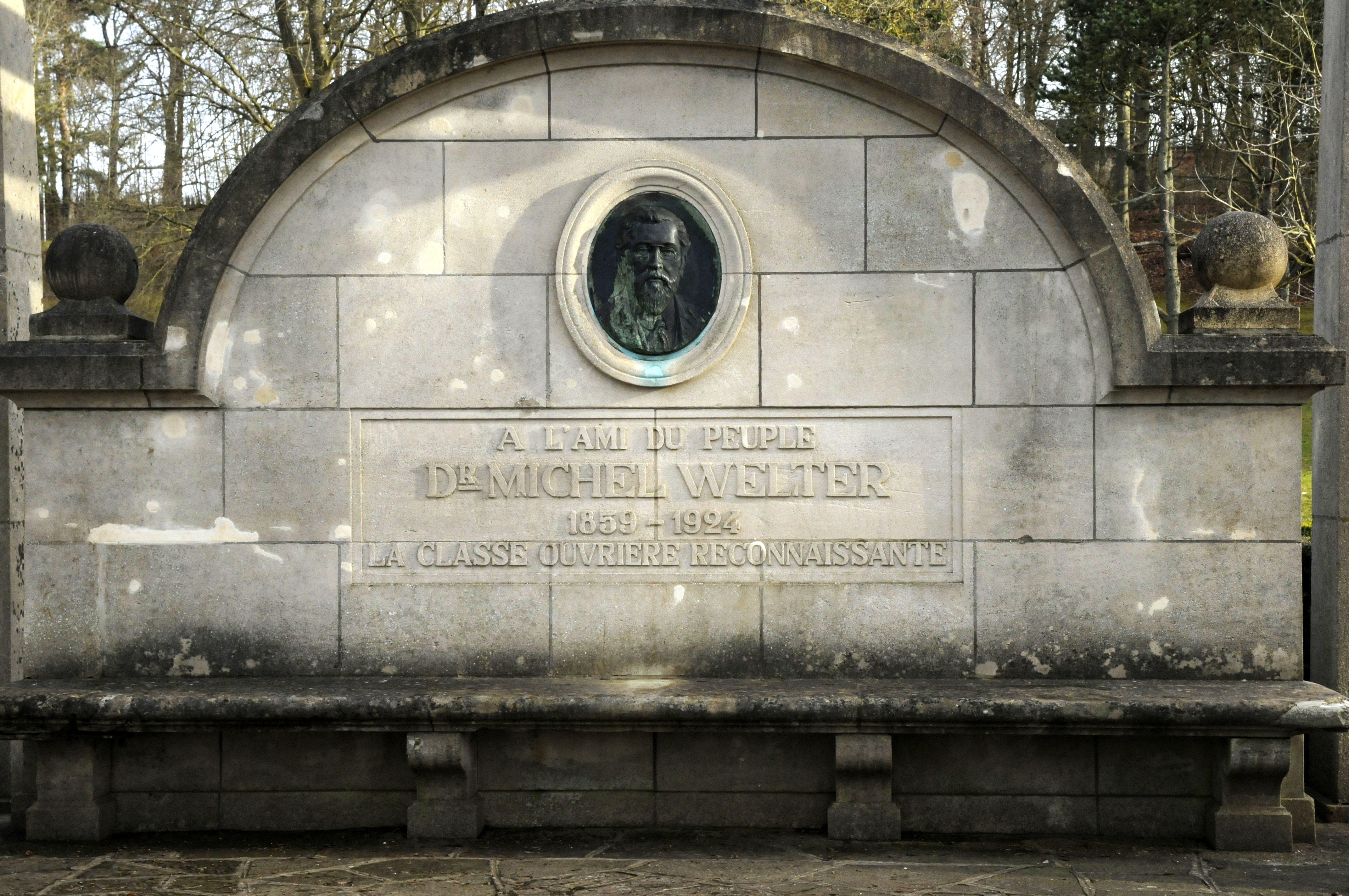Michel Welter on:
[Wikipedia]
[Google]
[Amazon]
 Dr. Michel Welter (21 March 1859,
Dr. Michel Welter (21 March 1859,
"Was bedeuten die Straßennamen der Stadt? – Welter (Rue Michel)."
(in German) ''Ons Stad'', No. 98, 2011. p. 55 In 1896 he was elected to the Towards the end of the war he was a member of the Luxmbourgish Soviet, which called for the nationalisation of the iron industry, the introduction of the 8-hour day, the abdication of the Grand Duchess and the establishment of a republic. The question over the dynasty and the form of government was decided in the 1919 referendum; the same year saw the introduction of women's suffrage. Welter joined the Chamber of Deputies again in 1920, but was not re-elected in 1922.
Two years later, he died of a stroke, in 1924.
The city of Esch dedicated a monument to him on 21 August 1927 in the park on the Galgenberg, with the inscription: ''À l'ami du peuple - la classe ouvrière reconnaissante'' ("To the friend of the people - the grateful working class").
Towards the end of the war he was a member of the Luxmbourgish Soviet, which called for the nationalisation of the iron industry, the introduction of the 8-hour day, the abdication of the Grand Duchess and the establishment of a republic. The question over the dynasty and the form of government was decided in the 1919 referendum; the same year saw the introduction of women's suffrage. Welter joined the Chamber of Deputies again in 1920, but was not re-elected in 1922.
Two years later, he died of a stroke, in 1924.
The city of Esch dedicated a monument to him on 21 August 1927 in the park on the Galgenberg, with the inscription: ''À l'ami du peuple - la classe ouvrière reconnaissante'' ("To the friend of the people - the grateful working class").
''German occupation of Luxembourg''
GWPDA, 21 May 1998. Retrieved on 2006-07-26. * {{DEFAULTSORT:Welter, Michel 1859 births 1924 deaths People from Heiderscheid Members of the Chamber of Deputies (Luxembourg) Luxembourgian physicians Luxembourgian journalists Male journalists Tageblatt people Luxembourgian people of World War I Luxembourg Socialist Workers' Party politicians Alumni of the Athénée de Luxembourg Ministers for Agriculture of Luxembourg 19th-century Luxembourgian politicians
 Dr. Michel Welter (21 March 1859,
Dr. Michel Welter (21 March 1859, Heiderscheid
Heiderscheid () is a small town in northwestern Luxembourg. It is part of the canton of Wiltz, which is part of the district of Diekirch.
Previously, it was a former commune but was merged into Esch-sur-Sûre (with Neunhausen
Neunhausen ( ...
– 22 April 1924) was a Luxembourg
Luxembourg ( ; lb, Lëtzebuerg ; french: link=no, Luxembourg; german: link=no, Luxemburg), officially the Grand Duchy of Luxembourg, ; french: link=no, Grand-Duché de Luxembourg ; german: link=no, Großherzogtum Luxemburg is a small lan ...
ian politician
A politician is a person active in party politics, or a person holding or seeking an elected office in government. Politicians propose, support, reject and create laws that govern the land and by an extension of its people. Broadly speaking, ...
, and former leader of the Socialist Party
Socialist Party is the name of many different political parties around the world. All of these parties claim to uphold some form of socialism, though they may have very different interpretations of what "socialism" means. Statistically, most of ...
. A member of Luxembourg's Chamber of Deputies
The chamber of deputies is the lower house in many bicameral legislatures and the sole house in some unicameral legislatures.
Description
Historically, French Chamber of Deputies was the lower house of the French Parliament during the Bourbon R ...
, he served as the Director-General for Agriculture, Commerce
Commerce is the large-scale organized system of activities, functions, procedures and institutions directly and indirectly related to the exchange (buying and selling) of goods and services among two or more parties within local, regional, natio ...
, and Industry from 24 February 1916 until 3 January 1917, during the German occupation
German-occupied Europe refers to the sovereign countries of Europe which were wholly or partly occupied and civil-occupied (including puppet governments) by the military forces and the government of Nazi Germany at various times between 1939 ...
.Thewes (2003), p. 69
He was one of the fiercest defenders of Victor Thorn's National Union Government. Poorly implemented policies designed to avoid a food shortage back-fired, and the country only narrowly averted a famine.Letter from Thorn to Buch (in German), 28 August 1916 Welter, as the minister responsible for both agriculture and commerce, was held responsible; on 22 December, Welter was censured by the Chamber of Deputies. Although Thorn sought to avoid firing Welter, he was left with no choice, and replaced him with Ernest Leclère.
Born on 21 March 1859 in Heiderscheid to a family of modest means, he studied at several European universities, before settling in Esch-Alzette as a doctor. His work as a physician brought him into contact with the miners and railway workers there, and it was their poor living and working conditions which drove him to take up politics. He campaigned for women's right to vote, paid holidays, social security and decent housing for workers.Beck, Fanny"Was bedeuten die Straßennamen der Stadt? – Welter (Rue Michel)."
(in German) ''Ons Stad'', No. 98, 2011. p. 55 In 1896 he was elected to the
Chamber of Deputies
The chamber of deputies is the lower house in many bicameral legislatures and the sole house in some unicameral legislatures.
Description
Historically, French Chamber of Deputies was the lower house of the French Parliament during the Bourbon R ...
for the first time, where his social campaigning soon earned him the nickname "de rouden Dokter" (= "the red doctor"). Yet Welter, seen as a radical by the middle-class Deputies, was criticised by the workers for his own middle-class background.
In 1902, Welter moved to Luxembourg city, where he co-founded the Social-Democratic Party. He was Luxembourg's delegate at the Second International and came into contact with Jean Jaurès
Auguste Marie Joseph Jean Léon Jaurès (3 September 185931 July 1914), commonly referred to as Jean Jaurès (; oc, Joan Jaurés ), was a French Socialist leader. Initially a Moderate Republican, he later became one of the first social dem ...
, Clara Zetkin
Clara Zetkin (; ; ''née'' Eißner ; 5 July 1857 – 20 June 1933) was a German Marxist theorist, communist activist, and advocate for women's rights.
Until 1917, she was active in the Social Democratic Party of Germany. She then joined the ...
and August Bebel
Ferdinand August Bebel (22 February 1840 – 13 August 1913) was a German socialist politician, writer, and orator. He is best remembered as one of the founders of the Social Democratic Workers' Party of Germany (SDAP) in 1869, which in 1875 mer ...
.
From 1896 to 1897 he wrote for the ''Escher Courrier'', then for the ''Patriot'', the ''Escher Volksblatt'', the ''Escher Journal'', and the ''Frankfurter Zeitung''. From 1913 to 1916 he edited the Tageblatt. Throughout his career, he got into several fights with the conservative ''Luxemburger Wort
''Luxemburger Wort'' is a German-language Luxembourgish daily newspaper. There is an English edition named the ''Luxembourg Times''.
History and profile
''Luxemburger Wort'' has been published since 1848. The paper was founded just three days ...
''.
In the debate over the Education Law of 1912 he campaigned for a strict separation of church and state. In 1916 he was appointed to the Thorn government, as minister for agriculture, commerce, and industry. His time as a member of the government was brief and difficult. He was accused of having made an agreement with the German occupiers to allow the import of badly needed food supplies into Luxembourg. Such an agreement was impossible due to Luxembourg's neutral status. He was dismissed from the government on 2 January 1917 and became director of the medical section of the spa in Mondorf.
Footnotes
References
*''German occupation of Luxembourg''
GWPDA, 21 May 1998. Retrieved on 2006-07-26. * {{DEFAULTSORT:Welter, Michel 1859 births 1924 deaths People from Heiderscheid Members of the Chamber of Deputies (Luxembourg) Luxembourgian physicians Luxembourgian journalists Male journalists Tageblatt people Luxembourgian people of World War I Luxembourg Socialist Workers' Party politicians Alumni of the Athénée de Luxembourg Ministers for Agriculture of Luxembourg 19th-century Luxembourgian politicians